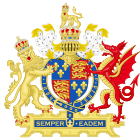The Act of Uniformity 1558 was an Act of the Parliament of England, passed in 1559,[c] to regularise prayer, divine worship and the administration of the sacraments in the Church of England. In so doing, it mandated worship according to the attached 1559 Book of Common Prayer. The Act was part of the Elizabethan Religious Settlement in England instituted by Elizabeth I, who wanted to unify the church. Other Acts concerned with this settlement were the Act of Supremacy 1558 and the Thirty-Nine Articles.
| Act of Parliament | |
 | |
| Long title | An Acte for the Uniformitie of Common Prayoure and Dyvyne Service in the Churche, and the Administration of the Sacramentes.[b] |
|---|---|
| Citation | 1 Eliz. 1. c. 2 |
| Dates | |
| Royal assent | 8 May 1559 |
| Repealed | 12 December 1974 |
| Other legislation | |
| Amended by | |
| Repealed by | Church of England (Worship and Doctrine) Measure 1974 |
| Relates to | |
Status: Repealed | |
Background
editElizabeth was trying to achieve a settlement after 30 years of turmoil during the reigns of Henry VIII, Edward VI and Mary I, during which England had swung from Roman Catholicism to Protestantism and back to Catholicism. The outcome of the Elizabethan Settlement was a sometimes tense and often fragile union of High Church and Low Church elements within the Church of England and Anglicanism worldwide.
The Act
editThe Act set the order of prayer to be used in the 1559 Book of Common Prayer. All persons had to attend Anglican services once a week or be fined 12 pence (equal to about three days wages or around £24 today).[d]
Repeal
editOn 27 September 1650, the Act was repealed by the Rump Parliament of the Commonwealth of England with the "Act for the Repeal of several Clauses in Statutes imposing Penalties for not coming to Church",[3] but this Act was rendered null and void with the Restoration of the monarchy in 1660. Most of the Act was repealed by the Statute Law Revision Act 1888.
See also
editNotes
edit- ^ The citation of this act by this short title was authorised by section 5 of, and Schedule 2 to, the Statute Law Revision Act 1948. Due to the repeal of those provisions, it is now authorised by section 19(2) of the Interpretation Act 1978.
- ^ These words are printed against this Act in the second column of Schedule 2 to the Statute Law Revision Act 1948, which is headed "Title".
- ^ The Act of Uniformity was passed in April 1559.[1] However, all Acts of Parliament prior to the Acts of Parliament (Commencement) Act 1793 were ex post facto laws that came into effect on the first day of the session. The first Parliament of Elizabeth I met three months earlier in January 1558; the year 1559 did not begin until 25 March 1559. Therefore, the Act of Uniformity was officially dated 1558 by the Statute Law Revision Act 1948.
- ^ Average earnings in 1558 were £6.06 per annum, equal to 2s. 4d. a week or 4d. a day.[2]
References
edit- ^ "Elizabeth's Act of Uniformity (1559), 1 Elizabeth, Cap. 2". Hanover Historical Texts Project. March 2001. Retrieved 23 December 2018.
- ^ Clark, Gregory. "What Were the British Earnings and Prices Then? (New Series)". Measuring Worth. Retrieved 16 June 2021.
- ^ Firth, C.H.; Rait, R.S., eds. (1911), "September 1650: Act for the Repeal of several Clauses in Statutes imposing Penalties for not coming to Church", Acts and Ordinances of the Interregnum, 1642-1660, pp. 423–425